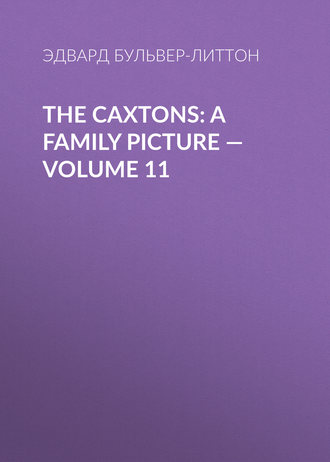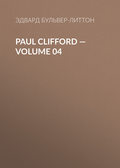
Эдвард Бульвер-Литтон
The Caxtons: A Family Picture — Volume 11
Poor Sir Sedley, to whom all these matters were as unfamiliar as the theology of the Talmud, after some vain efforts to slide the conversation into easier grooves, fairly gave in, and with a compassionate smile on his handsome countenance, took refuge in his easy-chair and the contemplation of his snuff-box.
At last, to our great relief, the servant announced Lord Castleton's carriage; and with another speech of overpowering affability to me, and a cold shake of the hand to Sir Sedley, Lord Castleton went his way.
The breakfast-parlor looked on the street, and I turned mechanically to the window as Sir Sedley followed his guest out of the room. A travelling carriage with four post-horses was at the door, and a servant, who looked like a foreigner, was in waiting with his master's cloak. As I saw Lord Castleton step into the street, and wrap himself in his costly mantle lined with sables, I observed, more than I had while he was in the room, the enervate slightness of his frail form, and the more than paleness of his thin, joyless face; and then, instead of envy, I felt compassion for the owner of all this pomp and grandeur,—felt that I would not have exchanged my hardy health and easy humor and vivid capacities of enjoyment in things the slightest and most within the reach of all men, for the wealth and greatness which that poor youth perhaps deserved the more for putting them so little to the service of pleasure.
"Well," said Sir Sedley, "and what do you think of him?"
"He is just the sort of man Trevanion would like," said I, evasively.
"That is true," answered Sir Sedley, in a serious tone of voice, and looking at me somewhat earnestly. "Have you heard? But no, you cannot have heard yet."
"Heard what?"
"My dear young friend," said the kindest and most delicate of all fine gentlemen, sauntering away, that he might not observe the emotion he caused, "Lord Castleton is going to Paris to join the Trevanions. The object Lady Ellinor has had at heart for many a long year is won, and our pretty Fanny will be Marchioness of Castleton when her betrothed is of age,—that is, in six months. The two mothers have settled it all between them."
I made no answer, but continued to look out of the window.
"This alliance," resumed Sir Sedley, "was all that was wanting to assure Trevanion's position. When Parliament meets, he will have some great office. Poor man, how I shall pity him! It is extraordinary to me," continued Sir Sedley, benevolently going on, that I might have full time to recover myself, "how contagious that disease called 'business' is in our foggy England! Not only Trevanion, you see, has the complaint in its very worst and most complicated form, but that poor dear cousin of mine who is so young [here Sir Sedley sighed], and might enjoy himself so much, is worse than you were when Trevanion was fagging you to death. But, to be sure, a great name and position, like Castleton's, must be a very heavy affliction to a conscientious mind. You see how the sense of its responsibilities has aged him already,—positively, two great wrinkles under his eyes. Well, after all, I admire him and respect his tutor: a soil naturally very thin, I suspect, has been most carefully cultivated; and Castleton, with Trevanion's help, will be the first man in the peerage,—prime minister some day, I dare say. And when I think of it, how grateful I ought to feel to his father and mother, who produced him quite in their old age; for if he had not been born, I should have been the most miserable of men,—yes, positively, that horrible marquisate would have come to me! I never think over Horace Walpole's regrets, when he got the earldom of Orford, without the deepest sympathy, and without a shudder at the thought of what my dear Lady Castleton was kind enough to save me from,—all owing to the Ems waters, after twenty years' marriage! Well, my young friend, and how are all at home?"
As when, some notable performer not having yet arrived behind the scenes, or having to change his dress, or not having yet quite recovered an unlucky extra tumbler of exciting fluids, and the green curtain has therefore unduly delayed its ascent, you perceive that the thorough-bass in the orchestra charitably devotes himself to a prelude of astonishing prolixity, calling in "Lodoiska" or "Der Freischutz" to beguile the time, and allow the procrastinating histrio leisure sufficient to draw on his flesh-colored pantaloons and give himself the proper complexion for a Coriolanus or Macbeth,—even so had Sir Sedley made that long speech requiring no rejoinder, till he saw the time had arrived when he could artfully close, with the flourish of a final interrogative, in order to give poor Pisistratus Caxton all preparation to compose himself and step forward. There is certainly something of exquisite kindness and thoughtful benevolence in that rarest of gifts,—fine breeding; and when now, re-manned and resolute, I turned round and saw Sir Sedley's soft blue eye shyly, but benignantly, turned to me, while, with a grace no other snuff-taker ever had since the days of Pope, he gently proceeded to refresh himself by a pinch of the celebrated Beaudesert mixture,—I felt my heart as gratefully moved towards him as if he had conferred on me some colossal obligation. And this crowning question, "And how are all at home?" restored me entirely to my self-possession, and for the moment distracted the bitter current of my thoughts.
I replied by a brief statement of my father's involvement, disguising our apprehensions as to its extent, speaking of it rather as an annoyance than a possible cause of ruin, and ended by asking Sir Sedley to give me the address of Trevanion's lawyer.
The good baronet listened with great attention; and that quick penetration which belongs to a man of the world enabled him to detect that I had smoothed over matters more than became a faithful narrator.
He shook his head, and, seating himself on the sofa, motioned me to come to his side; then, leaning his arm over my shoulder, he said, in his seductive, wincing way,—
"We two young fellows should understand each other when we talk of money matters. I can say to you what I could not say to my respectable senior,—by three years,—your excellent father. Frankly, then, I suspect this is a bad business. I know little about newspapers, except that I have to subscribe to one in my county, which costs me a small income; but I know that a London daily paper might ruin a man in a few weeks. And as for shareholders, my dear Caxton, I was once teased into being a shareholder in a canal that ran through my property, and ultimately ran off with L30,000 of it! The other shareholders were all drowned in the canal, like Pharaoh and his host in the Red Sea. But your father is a great scholar, and must not be plagued with such matters. I owe him a great deal. He was very kind to me at Cambridge, and gave me the taste for reading to which I owe the pleasantest hours of my life. So, when you and the lawyers have found out what the extent of the mischief is, you and I must see how we can best settle it. What the deuce! My young friend, I have no 'incumbrances,' as the servants, with great want of politeness, call wives and children. And I am not a miserable great landed millionnaire, like that poor dear Castleton, who owes so many duties to society that he can't spend a shilling except in a grand way and purely to benefit the public. So go, my boy, to Trevanion's lawyer,—he is mine, too. Clever fellow, sharp as a needle, Mr. Pike, in Great Ormond Street,—name on a brass plate; and when he has settled the amount, we young scapegraces will help each other, without a word to the old folks."
What good it does to a man, throughout life, to meet kindness and generosity like this in his youth!
I need not say that I was too faithful a representative of my father's scholarly pride and susceptible independence of spirit to accept this proposal; and probably Sir Sedley, rich and liberal as he was, did not dream of the extent to which his proposal might involve him. But I expressed my gratitude so as to please and move this last relic of the De Coverleys, and went from his house straight to Mr. Pike's office, with a little note of introduction from Sir Sedley. I found Mr. Pike exactly the man I had anticipated from Trevanion's character,—short, quick, intelligent, in question and answer; imposing and somewhat domineering in manner; not overcrowded with business, but with enough for experience and respectability; neither young nor old; neither a pedantic machine of parchment, nor a jaunty off-hand coxcomb of West End manners.
"It is an ugly affair," said he, "but one that requires management. Leave it all in my hands for three days. Don't go near Mr. Tibbets nor Mr. Peck; and on Saturday next, at two o'clock, if you will call here, you shall know my opinion of the whole matter." With that Mr. Pike glanced at the clock, and I took up my hat and went.
There is no place more delightful than a great capital if you are comfortably settled in it, have arranged the methodical disposal of your time, and know how to take business and pleasure in due proportions. But a flying visit to a great capital in an unsettled, unsatisfactory way; at an inn—an inn in the City too—with a great, worrying load of business on your mind, of which you are to hear no more for three days, and an aching, jealous, miserable sorrow at the heart such as I had, leaving you no labor to pursue and no pleasure that you have the heart to share in,— oh, a great capital then is indeed forlorn, wearisome, and oppressive! It is the Castle of Indolence, not as Thomson built it, but as Beckford drew in his Hall of Eblis,—a wandering up and down, to and fro; a great, awful space, with your hand pressed to your heart; and—oh for a rush on some half-tamed horse through the measureless green wastes of Australia! That is the place for a man who has no home in the Babel, and whose hand is ever pressing to his heart, with its dull, burning pain.
Mr. Squills decoyed me the second evening into one of the small theatres; and very heartily did Mr. Squills enjoy all he saw and all he heard. And while, with a convulsive effort of the jaws, I was trying to laugh too, suddenly in one of the actors, who was performing the worshipful part of a parish beadle, I recognized a face that I had seen before. Five minutes afterwards I had disappeared from the side of Squills, and was amidst that strange world,—Behind The Scenes.
My beadle was much too busy and important to allow me a good opportunity to accost him till the piece was over. I then seized hold of him as he was amicably sharing a pot of porter with a gentleman in black shorts and a laced waistcoat, who was to play the part of a broken-hearted father in the Domestic Draina in Three Acts that would conclude the amusements of the evening.
"Excuse me," said I, apologetically; "but as the Swan pertinently observes, 'Should auld acquaintance be forgot?'"
"The Swan, sir!" cried the beadle, aghast,—"the Swan never demeaned himself by such d—d broad Scotch as that!"
"The Tweed has its swans as well as the Avon, Mr. Peacock."
"St—st—hush—hush- h—u—sh!" whispered the beadle in great alarm, and eying me, with savage observation, under his corked eyebrows. Then, taking me by the arm, he jerked me away. When he had got as far as the narrow limits of that little stage would allow, Mr. Peacock said,—
"Sir, you have the advantage of me; I don't remember you. Ah! you need not look—by gad, sir, I am not to be bullied—it was all fair play. If you will play with gentlemen, sir, you must run the consequences."
I hastened to appease the worthy man.
"Indeed, Mr. Peacock, if you remember, I refused to play with you; and so far from wishing to offend you, I now come on purpose to compliment you on your excellent acting, and to inquire if you have heard anything lately of your young friend Mr. Vivian."
"Vivian? Never heard the name, sir. Vivian! Pooh, you are trying to hoax me; very good!"
"I assure you, Mr. Peac—"
"St—st—How the deuce did you know that I was once called Peac—, that is, people called me Peac—. A friendly nickname, no more. Drop it, sir, or you 'touch me with noble anger'!"






